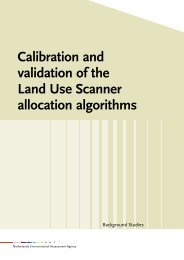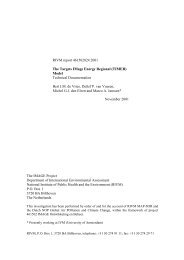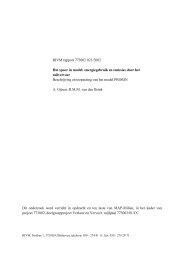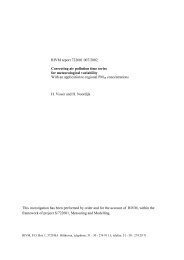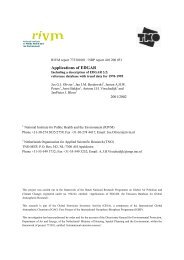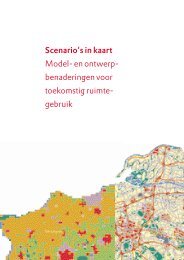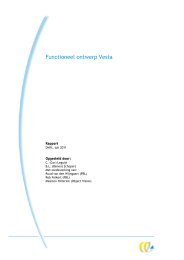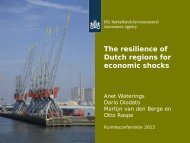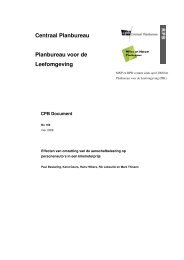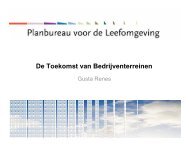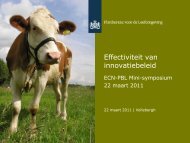EIPOT Final Project Report - Stockholm Environment Institute
EIPOT Final Project Report - Stockholm Environment Institute
EIPOT Final Project Report - Stockholm Environment Institute
You also want an ePaper? Increase the reach of your titles
YUMPU automatically turns print PDFs into web optimized ePapers that Google loves.
ERA-NET SKEP <strong>Project</strong> <strong>EIPOT</strong> (www.eipot.eu)<br />
“Development of a methodology for the assessment of global environmental impacts of traded goods and services”<br />
system, a good deal of harmonisation has already been done. For some countries, the first estimates<br />
are already in place.<br />
However, the international system is still not under way. As discussed in previous chapters, modelling<br />
exercises already exist to investigate the issue in a multi-regional input-output system. However, the<br />
models are largely driven by non-governmental, partly imputed data, put together by researchers and<br />
projects rather than statistical offices. This brings the danger of inconsistency, lack of transparency,<br />
discontinuation, or even waste of resources, and it will become a crucial issue once 'tough' decisions<br />
have to be made, for example in the context of international climate policy.<br />
As discussed earlier, much of the economic statistical data needed for the analysis is available, unlike<br />
environmental statistics. In the EU, a statistics regulation of the SEEA would help to improve the data<br />
situation. Regulation is expected in the coming year or shortly thereafter. Previously, the data were<br />
provided by gentlemen's agreement, but this has not generated sufficient coverage for all European<br />
countries. The details of the data to be collected are not yet decided. Air emissions, energy use and<br />
economic instruments are likely to be EU priorities.<br />
The 'Group of Four' (Go4) – Eurostat, together with DG <strong>Environment</strong> (DG ENV), the European<br />
<strong>Environment</strong> Agency (EEA) and the Joint Research Centre (JRC) – have signed a technical<br />
arrangement to establish ten data centres: natural resources, products (IPP), waste, soil, forestry, air,<br />
climate change, water, biodiversity, and land use. The main purpose of these data centres is to<br />
improve knowledge of the relationship between resource use, economic growth and environmental<br />
impacts. The Go4 arrangement outlines the short and medium-term division of responsibilities, clear<br />
reporting procedures to European bodies and coherent dissemination to data users. Eurostat is the<br />
lead organisation for three environmental data centres: natural resources, products (supporting<br />
integrated product policy) and waste. The EEA acts as data centre on air, climate change, water,<br />
biodiversity and land use; the JRC as a data centre on soil and forestry. The data centres will<br />
communicate to ensure that work is not duplicated.<br />
The main goals of the data centre on waste are exemplary for all Go4 data providers:<br />
• to provide data, indicators and other information to assess policy effectiveness;<br />
• to manage data, perform quality assurance, and coordinate data and information managed by other<br />
bodies (DG <strong>Environment</strong>, Joint Research Centre, European <strong>Environment</strong> Agency, other EU<br />
institutions, international organisations such as OECD and UN and so on);<br />
• to be the central entry point for reporting data under EU laws on waste;<br />
• to be the reference point for policy questions requiring (statistical) information on waste and<br />
associated environmental impacts;<br />
• to develop and coordinate methodologies to produce statistical data, information and indicators on<br />
the environmental impacts of waste generation and management, taking a life cycle perspective, in<br />
cooperation with the Go4 partners.<br />
A number of European policies, such as the Integrated Product Policy (IPP) Communication, the two<br />
Thematic Strategies on Sustainable Use of Natural Resources and on the Prevention and Recycling of<br />
Waste as well as the upcoming Sustainable Consumption and Production (SCP) Action Plan require<br />
life cycle-based indicators to monitor their effectiveness.<br />
Three data centres on resources, products and waste have so far been established. These centres will<br />
provide the necessary information to support the implementation and monitoring of these policy areas.<br />
65




